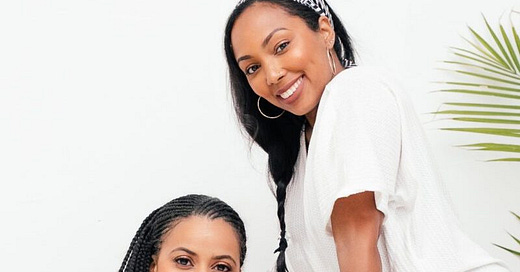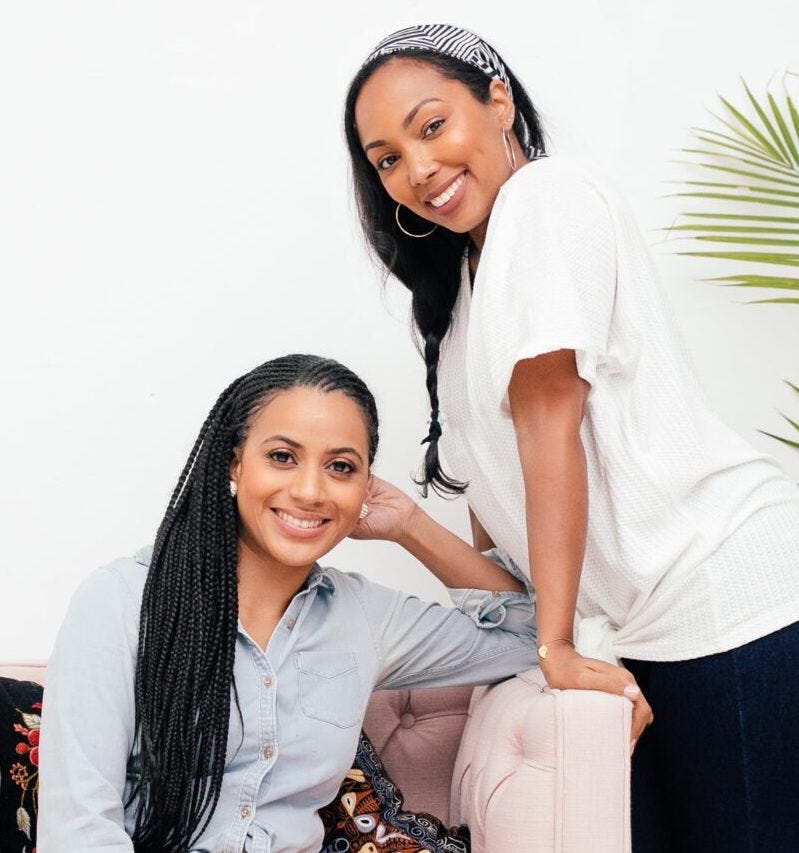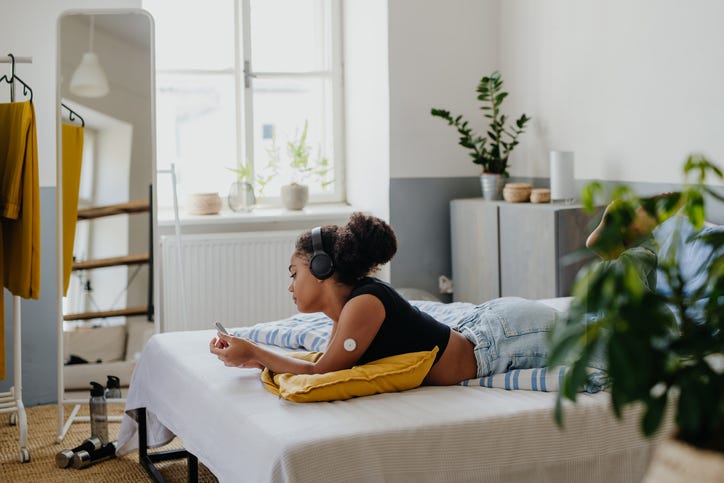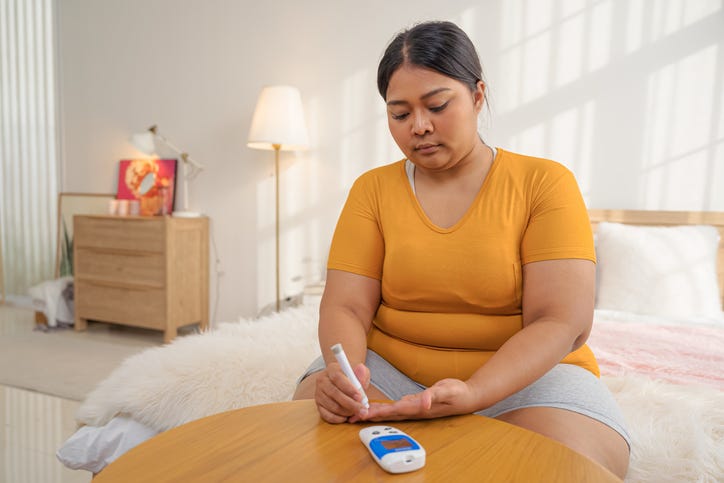You’re listening to Burnt Toast! I’m Virginia Sole Smith.
Today I am chatting with and Wendy Lopez, who you probably know from their beloved Food Heaven podcast.
Jess and Wendy are nationally recognized registered dietitian, nutritionists, and certified diabetes care and education specialists. I’ve known them a long time and one thing I’ve really admired is how they’ve built this really impressive online platform for all of these conversations, and yet also recognized when they were getting burned out and it was time to pivot.
Today we are talking about that whole process, but we’re also talking about their new project, Diabetes Digital, an innovative platform designed to empower individuals to effectively manage and prevent diabetes through virtual counseling, digital resources, support and guidance.
Paid subscribers will also get our bonus segment, where Wendy and Jess answer your questions about gestational diabetes, about managing diabetes with a history of disordered eating, and how to know if you need an RD or a therapist.
If you’re enjoying the podcast, make sure you’re following us (it’s free!) in your podcast player! We’re on Apple Podcasts, Spotify, Stitcher, and Pocket Casts! And while you’re there, please leave us a rating or review. (We like 5 stars!)
Episode 130 Transcript
Virginia
When I said you were coming on, so many people were like, “I love Food Heaven!” It has a cult following. And you did this for 12 years, which is ancient in podcasting terms. You are like the great-grandmothers of podcasting—and I mean that as a compliment. This is a pro-aging podcast.
Wendy
That’s how it feels.
Jess
We did the podcast for seven years and Food Heaven for 12.
Virginia
It’s a long time to have an online brand. It’s a long time to do anything in your life. But you’ve made some really big pivots lately. I would love to hear a little bit about what inspired this.
Wendy
It was a combination of things. One of the biggest things was: We were burned out by being in the online space and the constant influx of content. Especially working in the nutrition space, there’s just so much content that is misinformed, that’s diet-y, that is just exhausting to consume. Even if we’re not engaging with or following that type of content, you still get it one way or another. Then also being in this anti-diet space, that can be exhausting as well.
It was very fulfilling up until it wasn’t. And we also wanted to just spend more time offline.
Virginia
I relate to this so much.
Wendy
We’re still very passionate about nutrition education but we wanted to take that offline. That’s why we started the new business. We want to connect more with people one-on-one and have really complex, tough conversations that can’t be captured in an infographic or reel or whatever. It’s just so polarizing online.
We were like, how do we get back to why we originally came into this line of work? How do we have those conversations with people and make a meaningful impact? So we decided to transition out of the online space a little bit, to get some clarity on what it is that we actually want to do. We did a hard pause on the podcast and we will likely be phasing it out. We’re still figuring that out. But I think our energy is going to is going to be focused on the new business that moving forward.
Jess
We’ve also done a whole podcast series on this pivot because we didn’t want it to be something where a we just disappeared because that was definitely an option. Like, Goodbye.
Virginia
Just, Irish goodbye the whole like internet.
Jess
Ctrl Alt Delete on all of this.
I’m sure there are a lot of folks who can see themselves in this burnout and this “what’s next?” I really had no clue. I was like I’m going to be done with all of this. I think we were just taking that time in therapy or working with a business coach to just allow that space to ask these questions, to process the last 12 years. What’s worked, what hasn’t worked? How do you not get into the same patterns? I’m not saying that Food Heaven was a toxic work environment, but in some ways, it was because we’re very much like, “We can do everything.” We’ll take it all on and we’ll burn out and we can’t delegate. So, how do we work on those things? That’s pretty much what made us decide to pivot. I’ll never forget, I don’t know why I was listening to Jay Shetty—you know who Jay Shetty is?
Virginia
I don’t think I do.
Jess
He is a former monk that some people find problematic because I guess there’s evidence that he steals his quotes? Celebrities love him. But he did say something that resonated with me and it was something like, “you know it’s time to pivot when you’re doing this work more for other people than for yourself.” And I don’t know if he used the word performance, but it’s like you’re doing what other people expect of you and not necessarily what you want to do. That resonated because I was like, we have been really invested in the conversations around intuitive eating and all these things, and they are so important. And—we have been having the same conversation for the past eight years, and we’re ready to have a new conversation. I think that that quote helped me realize this conversation, for me to be happy and fulfilled, needs to evolve a little bit. Does that make sense?
Virginia
Yeah, it definitely makes sense. I did just Google Jay Shetty, out of curiosity, and he describes himself as a monk turned millionaire.
Jess
And that’s why people find him problematic.
Virginia
Sometimes people we feel complicated feelings about, can still say something useful.
I’ve been thinking about all of this, just in watching you guys over the years. You make so much content for free between Instagram and the podcast. I think a lot about how much this kind of work asks us to make lots of things for free for people and how problematic that is. There are just so many layers to how the burnout can happen. So I think it completely makes sense that you’re looking to take the conversation somewhere deeper and different.
Wendy
And there are also a lot of voices in this space. This whole idea of intuitive eating, Health at Every Size, it was very new, at least when I entered the world of nutrition. Now, there are a lot more people talking about this and bringing awareness. So it’s okay to gracefully bow out. We feel like, it’s in good hands.
Jess
That’s super positive. Because we were always about being culturally inclusive and culturally relevant, and a lot of our podcast focused on that, and especially before 2020, because I know that after 2020 there were a lot more people focusing on all those things. But for us, it had always been a part of the conversation for these past 12 years. Racism and social justice, and especially the intersections of food and nutrition and all those things. So I am happy that there are a lot more people who are incorporating this into their work because it means it allows for more diverse conversation from different folks. I think that’s a good thing. We are excited for what the future holds.
Virginia
I think all the time about an episode you guys did in 2020 you were basically like, “Stop asking us to do so much.” It was a master class in boundary setting. You said, as Black women, we’re being asked to do all of this extra work right now because a bunch of you just arrived at this conversation that we’ve been having for years and that’s really invalidating. It was such a powerful episode. And this feels like a continuation of that very important boundary setting. So I’m very happy for both of you.
Wendy
I remember that episode. We were completely over it.
Virginia
I mean, as well you should have been, it was absurd.
So let’s start talking about the new venture, Diabetes Digital. What inspired this project?
Jess
As we mentioned, we took some time to think and reflect on why we got into the field of nutrition in the first place, what we see for ourselves over the next like 10 or 20 years, and it definitely isn’t dancing on the gram—no shade to anyone who has fun dancing on the gram. We realized we want to do less social media, more direct impact. As Wendy mentioned, we’re both dietitians and diabetes educators and we both have a family history, too, with diabetes and with pre-diabetes. I mean, I had pre-diabetes during the pandemic. We know that there are so many people, especially Black and brown folks who are affected by these things. And we were thinking how great would it be to be able to bridge the gap with all the work that we do through Food Heaven, and being weight inclusive and culturally relevant and bridge that with something that so many people deal with on a day-to-day basis, whether it’s diabetes or trying to prevent diabetes, people who may have like borderline. So that’s kind of where the idea came from.
There are a couple people who are doing this, but not many. There are people who are doing diabetes work like through a culturally inclusive lens. So I want to shout out Lorena Drago who’s been doing the work, Constance Brown-Riggs, both dietitians. But we haven’t seen many people who are bringing all these things together.
We want things to be financially accessible, as well. There are so many people who wouldn’t be accessible otherwise to not use insurance. So we’re trying to be able to accept as many insurance carriers as possible.
Many of the patients who we’ve worked with who have diabetes, they’ll come to us and say, “My doctor just gave me this list,” or “my doctor told me I have to cut out all these cultural foods.” So what we realize is doctors, for the most part, have a very limited training when it comes to nutrition and also with diabetes. They think that you have to cut out all these carbs and that’s just not the case at all. So part of this is helping with a lot of the misinformation out there as well.
Virginia
One of the most common questions I get asked whenever I write about weight and health or doing an interview about it, is “okay, but what about diabetes?”It’s almost framed as “this is how we’re going to catch you out, with your weight inclusive health care talk.” What other misconceptions do you see in terms of what people commonly encounter around weight and diabetes management?
Wendy
One of the biggest misconceptions is that you have to lose weight in order to improve your blood sugar. We know that significant and intentional weight loss is very hard, long term. Oftentimes achieving glucose control becomes synonymous in medical settings with weight loss. So we see providers all the time saying, “You have to lose weight in order to improve your A1C,” which is an indicator of your blood sugar balance. They might even recommend extreme diets, like Jess said, cutting out carbohydrates, which is misinformed, or really rapid weight loss methods. Now it’s even more complicated because these GLP1s are have become even more popular, like Ozempic, for example, which is intended for Type Two Diabetes, but now it’s also being promoted as this weight loss drug.
So weight and blood sugar becomes intertwined, when it’s possible to achieve glucose balance at a higher weight independent of weight loss. It’s two separate things.
Then, once you start recommending these extreme diets and weight loss measures, you start having other issues like nutrient deficiencies. You start having a lot of fluctuations with your glucose because you might be restricting and bingeing. And that becomes really hard, especially when you’re on medication.
For example, if you’re on insulin, and you’re doing these restrictive diets, your risk for hypoglycemia—which is when your blood sugar drops too low—is much higher. And that becomes very dangerous because you can pass out, you can go into ketoacidosis. There are a lot of complications that can happen if your blood sugars are running really high and then are running really low when you start having these ups and downs.
I think reframing the conversation and removing the focus from weight, instead having conversations around improving someone’s relationship to food and also exploring what other things can impact blood sugars. Their stress, mental health, sleep are all big ones; medication adherence, like are you taking your medication consistently? Do you understand the dosing and the frequency of medications? Because there can be huge gaps with that as well, because maybe providers focus a lot of their session on weight loss and then didn’t really go over what the plan is for medication.
Because these diabetes medications can be very, very complicated, especially if you’re on multiple medications and you’re on different types of insulin. So, if we focus more so on all these other things that are likely to like impact blood sugar a lot more than weight, I think there would be improved health outcomes for people with diabetes, especially type two diabetes.
You can develop type two diabetes at any weight, especially if there’s a genetic predisposition. If you have a strong family history, you’re at a higher risk. So it’s really important to look at the labs, the metabolic markers, to inform what the intervention is going to be versus what the number on the scale is.
Virginia
As you’re talking, I’m thinking so much of the focus on weight loss comes from the fact that we really blame people when they get type two diabetes. How do you see that bias against folks with type two intersecting more broadly with medical racism and the other cultural biases we see playing out in healthcare?
Jess
More often than not, patients from marginalized communities may encounter health care providers who make assumptions about their lifestyles or what they are or aren’t doing. I will always use this example of myself. I asked a doctor, “Can you check my vitamin b12 and iron?” And she was like, “You don’t need to check those. That would only be people who follow a vegetarian diet.” And I was like, “Well I do, so can you check?”
Virginia
She just assumed you wouldn’t be a vegetarian?
Jess
So many assumptions. And the same thing happens with diabetes. People make a lot of assumptions that it’s your fault. I’ve seen doctors tell patients, “You brought this on yourself because you’re eating too many of these foods,” or “You’re overindulging.” It’s kind of this God complex. It’s ridiculous.
I think that for a lot of patients who feel like their diabetes is their fault, they are going to be more disempowered and less likely to engage in health promoting behaviors or in self-management, because they’re getting, from not only their doctors, but from the world, this message that they failed. They’ve done something wrong.
It’s really important to take away these cultural biases and stereotypes because if you go into it thinking this is this person’s fault, you think that they eat a certain way or all these things, and there are no other factors that can be involved that might be out of the patient’s control, like maybe living in a food desert or what some people might call food apartheid, all these different things. So I think that that can definitely lead to worse health outcomes, including complications with diabetes.
Virginia
That feels like such a huge piece of it, which is so rarely there when doctors are handing over generic, one size fits all advice on how to approach this treatment.
Tell us a little more about how Diabetes Digital will work. Like let’s say I just got diagnosed with diabetes. How do I find you? What am I going to do with you?
Jess
Okay, so if you have been diagnosed with diabetes, or had it for a long time and want more support, or you have pre-diabetes, or even just have a strong family history: Go to our website, and fill out our Get Started form. We’ll let you know if we work in your state. We’re in 23 states right now, and we accept insurance in all 23 — Aetna, Cigna, United Healthcare, Blue Cross Blue Shield and Medicare, with more to come. And the amazing thing is that most of our patients actually don’t pay anything — under their preventative benefits, they pay nothing out of pocket and have unlimited visits. Not all! But most.
If you are out of network: We also have an affordable self-pay membership where you get to meet with a dietitian who specializes in diabetes and all these different intersections. And you can try to get reimbursed with your out-of-network benefits. You can also pay with Flex Spending or HSA plans. So do the Get Started quiz and we will be able to tell you what you qualify for.
As we mentioned, we really want to tailor our approach to resonate with your cultural background. Of course we don’t know every single culture but one way that I like to think about it—this I’m stealing from our dietitian friend Alice Figueroa—is being culturally humble. Absorbing and learning as much as we can and being curious.
Of course, we are weight inclusive. So we are focusing on well being over weight loss and well-being over a number on the scale.
Virginia
This is really, really a paradigm shift in terms of how we think about diabetes care and how we think about managing a chronic condition. It must feel so different for folks than the way people are often feeling, like they’re kind of going in alone and then showing up at these appointments every few months to get scolded and wrist slapped, and told they’re not doing a good enough job.
This feels better than that. I like it better.
Wendy
It’s kind of surprising, because diabetes is one of the most prevalent chronic conditions and the rates continue to grow exponentially, year after year. We were like, wow, there has to be something out there. Because we were looking to see well, what’s our competition if we were to do a platform like this, and we have yet to find one that offers everything that we offer. And it’s so needed,
There is a huge lack of diabetes resources that are culturally competent, period. But especially because we want to expand to offer Spanish speaking services and Spanish speaking resources. That is something that’s also just really, really hard to find. We’re really excited because we think this is going to help a lot of people and it’s really filling a gap that’s long overdue to be filled.
Virginia
I love it. Alright, we are going to tackle a couple of listener questions.
Wendy
Let’s do it.
Virginia
This person writes,
After years of dieting and disordered eating, I started powerlifting and eating freely, my relationship with with food, and my body improved drastically. And then I was diagnosed with type two diabetes. For the past year, I have been struggling and basically failing with how to manage this. It’s just back to the cycle of dieting, and then going all out. Any restriction really, really messes me up. But obviously, I care about my long term health. I would love to hear your thoughts. How do people with a history of disordered eating take on illnesses that can at least partially be managed via what they eat? Is that even possible? I’m at a loss.

















